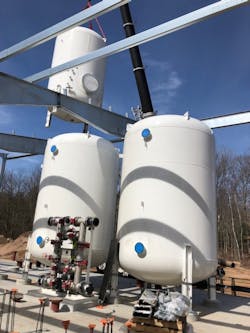Westfield PFAS Emergency Response
Cost: $16 million
Location: Westfield, Mass.
Year: 2019-12-01
Size: 5,300 gpm
Owner: City of Westfield, Mass.
Designers: Tighe & Bond Inc., CDM-Smith
Contractor: R.H. White Construction
In response to PFAS contamination of the Barnes Aquifer, the city has been rapidly bench-scale testing, planning, designing and constructing PFAS treatment systems at multiple well sites to ensure safe drinking water was supplied to residents. The city had goals to construct new treatment facilities as quickly as possible to ensure safe drinking water and to lead broader industry discussion on how to respond to PFAS. Per- and polyfluoroalkyl substances (PFAS) are a group of emerging contaminants that are causing highly charged discussions between regulators, public health agencies, municipal water suppliers and the public. Over the past several years, the city of Westfield has been at the forefront of these discussions.
The city of Westfield has a population of approximately 42,000 people and provides water service through a combination of surface water and groundwater sources. In particular, the north half of the city is served by four wells.
In 2016, the U.S. EPA lowered the health advisory level for Perfluorooctanoic Acid (PFOA) and Perfluorooctane Sulfonic Acid (PFOS) to 70 ppt. Testing confirmed that Westfield’s Well 7 and Well 8 were above the health advisory level and Well 1 and Well 2 were close to the health advisory level.
The city responded by shutting down Wells 7 and 8 prior to the implementation of the health advisory level. The north half of the city has limited hydraulic interconnection with the southern half of the city, so loss of these wells created vulnerability. Water restrictions were implemented, so the north half of Westfield was supplied from the south half, along with limited running of Well 1 and Well 2 as needed.
Later in 2016, Westfield retained CDM-Smith to perform alternative analysis and bench-scale testing of two types of granular activated carbon (GAC) for PFAS removal, finding both coal-based and coconut-based GAC products to be appropriate and cost-effective treatment alternatives for Westfield’s water. CDM-Smith then commenced design of the Owen District Road Water Treatment Plant (WTP) to provide treatment of water from Well 7 and Well 8.
2018 marked Westfield’s plan to retain Tighe & Bond to permit and design a temporary GAC treatment system for Well 2 to allow the city to reactivate this well while the Owen District Road WTP was being designed and constructed.
The temporary treatment system consisted of a concrete foundation, water main and chemical feed piping from the adjacent Well 3 building, as well as a single GAC filter vessel. To date, Well 2 has treated more than 75 million gal of water, which has consistently been non-detect for the targeted PFAS compounds.
The 2,600 gpm Dry Bridge Road WTP currently is under design by Tighe & Bond. Following evaluation of alternative locations, a site was selected on city-owned property between Well 1 and Well 2. 6,000 ft of raw water piping and 2,400 ft of finished water piping are required as part of the WTP construction because the two wells are not immediately adjacent to each other.
Westfield currently lacks space for staff on the north half of the city, which is a concern given the construction of the two new water treatment plants. The estimated cost of the Dry Bridge Road WTP, including the raw and treated water mains, is approximately $10 million and construction of this facility is anticipated to commence in late 2019.
Project Year: 2019-12-01Contractor: R.H. White Construction Designers: Tighe & Bond Inc., CDM-Smith Owner: City of Westfield, Mass. Location: Westfield, Mass. Cost: $16 million Size: 5,300 gpm